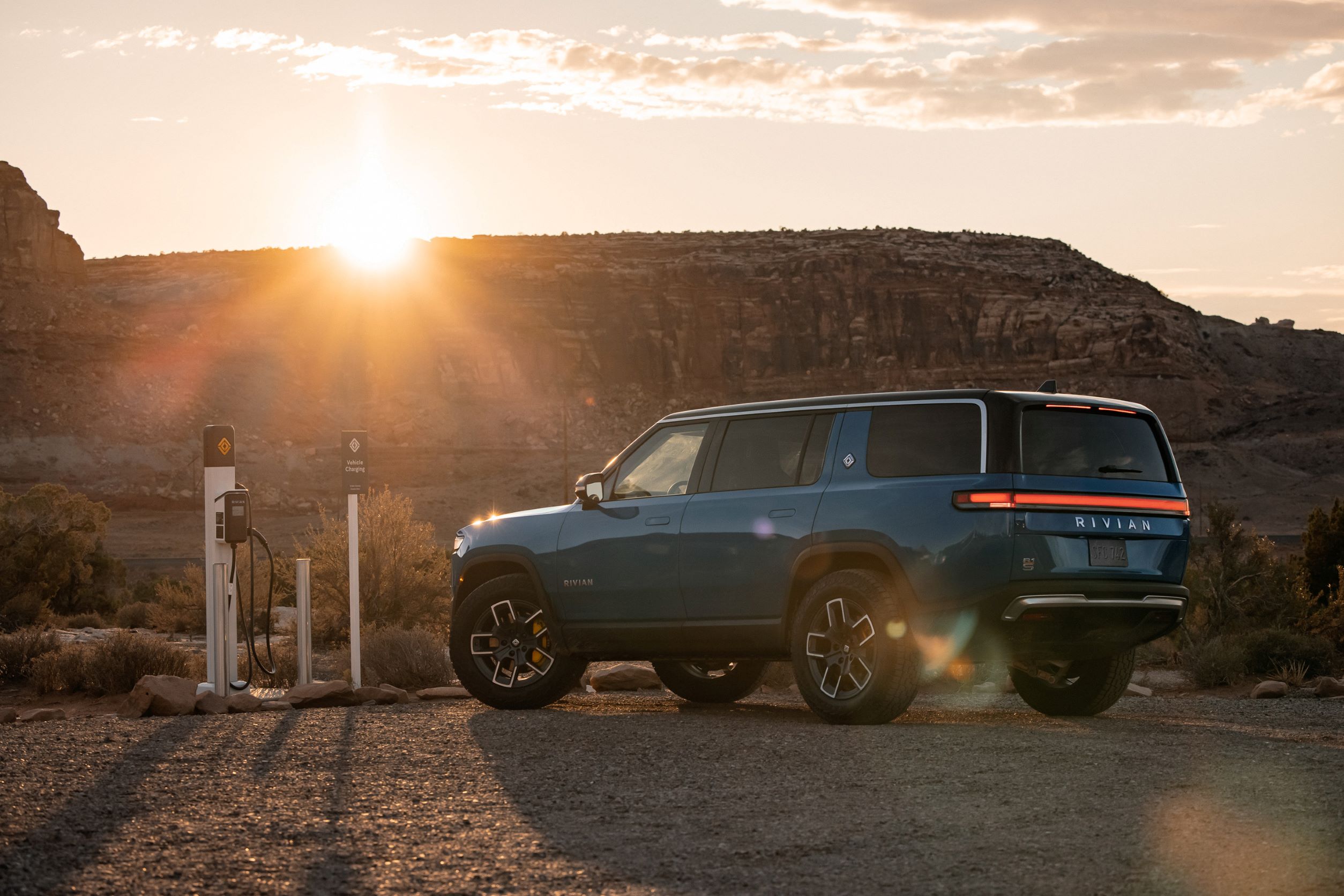Two new EV charging stations in one Colorado state park may not sound like much. But the Rivian chargers are among the first outposts in what will likely grow into a massive grid.
On March 11, the office of Colorado Governor Jared Polis announced that Rivian is poised to install two new EV charging stations at Cheyenne Mountain State Park.
Officials have not yet announced a timeline for the installation at the park, located just south of Colorado Springs. However, it’s an early signal of a more electrified future for the state. Rivian agreed to partner with Colorado Parks and Wildlife (CPW) in early 2021 and committed to installing its Waypoint Level 2 EV charging stations at 50 parks statewide.

State officials confirmed that Rivian will install, operate, and maintain the stations at no cost to the state.
“Per a signed agreement, Rivian will install, operate, and maintain up to 100 electric vehicle charging stations for park visitors at up to 50 state park site locations managed by CPW,” said Kara Powell, deputy press secretary at the Colorado Governor’s Office.
“The charging stations are intended for public use and will be located in areas where the public has access. The products and services supplied by Rivian will be at no charge to CPW.”
The installs move forward in support of the Polis administration’s commitment to put more than 1 million electric vehicles on roads by 2030. The two new stations will join a growing network of EV chargers that will appear throughout the state.
CPW has already worked to place EV chargers at a handful of Front Range parks, including St. Vrain State Park in Longmont and Staunton State Park in Pine.
Colorado Makes EVs a Priority
For the state, the action boils down to a response to consumer demand. In the last 3 months of 2021, Colorado saw record-breaking EV sales. Recent monthly sales surged to near triple pre-pandemic levels, according to the Governor’s Office.
The EV popularity boom comes after Governor Polis signed sweeping bipartisan transportation legislation in June 2021. The bill, known as SB21-260, provides more than $730 million over the next 10 years to support electric transportation. It also includes the Community Access Enterprise to build charging stations across the state.
Colorado has become a leader in the EV charge under Polis’ leadership. Back in 2019, it became the first state in the nation to adopt zero-emission vehicle standards. Consumer incentives and investments in EV infrastructure like SB21-260 have followed.
Polis built a case for the new Rivian stations, and CPW’s plan to put stations in parks across the state, by pointing to Colorado’s natural splendor and resulting popularity among visitors. He said:
Colorado has a world-class state park system and is a leader in the cost-saving transition to electric vehicles. Our administration is making record investments in EVs and are [sic] empowering Coloradans who are choosing electric vehicles to make a great escape to iconic outdoor destinations while recharging for their next adventure. We are committed to delivering cleaner air and driving eco-friendly tourism to preserve and protect our amazing public lands.
CPW’s work to install stations at such destinations this year seeks to build on the following existing consumer incentives:
- In 2020, Colorado released the Colorado EV Plan, which sets clear goals for transportation electrification: 940,000 light-duty EVs and at least 1,000 zero-emission transit buses by 2030.
- Charge Ahead Colorado, the state’s flagship EV charging station grant program, has distributed awards to help pay for more than 1,500 stations statewide. They appear at a wide range of public locations.
- The state’s EV fast-chargers corridor program has installed stations at 20 locations along Colorado interstates and highways. The program schedules another 14 for installation by the end of 2022.
Will Toor, executive director of the Colorado Energy Office, explained what’s probably the most robust EV incentive for most drivers: the bottom line.
“The cost of fueling an EV is the equivalent of paying only a dollar a gallon for gas,” Toor said. “The Polis administration is committed to saving Coloradans money at the fuel pump by accelerating the transition to electric cars, trucks, and buses across the state.”
Rivian EV Charging Stations in CO Parks: Details
Rivian Waypoint Level 2s can add up to 25 miles of driving range with an hour of charging. The capacity may not support a cross-country haul, but their utility at parks should help facilitate day use or overnight stays. Most critically, the effort looks to extend the electric charging grid to new areas for EV drivers to explore.
View this post on Instagram
“Our Rivian Waypoints network was specifically designed with our nation’s parks in mind,” said Trent Warnke, senior director of Energy and Charging Solutions at Rivian. “These chargers are open-network, suitable for all EV-driving adventurers, with their placement strategically focused on where they’re needed most.”
Look for initial Rivian Waypoint Level 2 installs at CPW’s Southeast Regional Office in Colorado Springs, the Denver Metropolitan Area, and Lake Pueblo, John Martin Reservoir, Barr Lake, Chatfield, and Castlewood Canyon state parks.
Rivian has also channeled significant resources into a charging network in Tennessee’s state parks. Per that agreement, Rivian covered costs for design and installation, plus network access fees, equipment service, and maintenance for 10 years.
Rivian’s move in Colorado is the latest news in an electrification movement at parks that’s not necessarily new but appears to be gaining momentum. BMW put 100 chargers at national parks nationwide as early as 2019.








